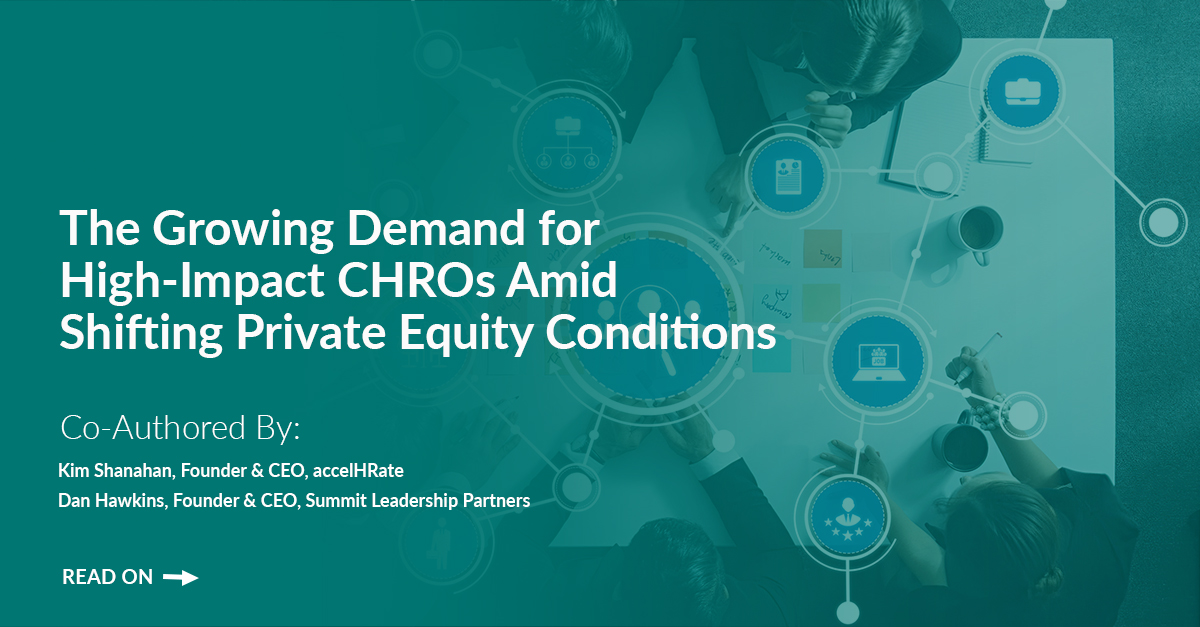The Growing Demand for High-Impact CHROs Amid Shifting Private Equity Conditions

Despite a slower than expected M&A market in 2025, Private equity (PE) firms remain focused on long-term value creation by doubling down on operational improvements, leadership effectiveness, and scalable growth within their portfolio companies. In this uncertain environment, the need for transformational leadership remains high, and at the center of this transformation is a critical, often under-leveraged role: the Chief Human Resources Officer (CHRO).
In an industry historically anchored in financial performance — relying heavily on CEOs and CFOs — human capital has emerged as a key lever for value creation. As firms face prolonged hold periods, shifting exit windows, and slower deal flow, building high-performing leadership teams and scalable talent infrastructure has become essential. The CHRO plays a pivotal role in navigating this complexity, helping companies stay resilient and prepared for when market activity eventually rebounds.
Transitioning from a public company or corporate position to a CHRO role in a PE-backed company is both rewarding and challenging. If senior HR professionals are considering this move, know that while the pace and demands are intense, the opportunity to drive transformational change and contribute directly to value creation makes it a compelling and impactful career path.
The Evolving Role of the CHRO in Private Equity-Backed Businesses
Even as deal-making remains subdued, the role of the CHRO has shifted from a back-office function to a strategic powerhouse. No longer just responsible for managing benefits, payroll, or compliance, the CHRO is now seen as an integral strategic thought partner to the CEO and CFO, guiding companies through periods of rapid growth, restructuring, and exit preparation.
In this environment, a successful CHRO in a PE-backed company isn’t just an administrator of HR functions; they are a hands-on change agent, responsible for driving the development of the company’s most critical asset — its people. In a world where financial performance and organizational agility goes hand-in-hand, the CHRO must build the leadership infrastructure needed to scale a business quickly while maintaining alignment with the company’s strategic goals.
Key Qualities of an Impactful CHRO in a PE-Backed Company
In today’s uncertain PE environment, the need for CHROs with specific skills has never been more urgent. Investors, CEOs, and boards are increasingly recognizing that the caliber of a company’s leadership and its ability to scale rapidly will be key to successfully achieving growth targets and realizing exits.
There are several key characteristics of a strong CHRO in a private equity-backed company:
- Business and Financial Acumen
An effective CHRO must not only understand human capital but also possess a deep understanding of the business and financial landscape. The ability to link talent strategy to the company’s exit plan is crucial. They must understand the “why” behind financial objectives and be able to align talent decisions with value creation levers, ensuring that human resources investments contribute directly to the company’s bottom line. - Strategic Agility
CHROs must remain agile as timelines shift, and business strategies evolve. They need to develop and pivot HR strategies that are closely aligned with the company’s exit goals and evolving business needs. This adaptability is key as the company scales, restructures, or adjusts to new leadership or market conditions. - Hands-On Leadership
Unlike some of their counterparts in larger public organizations, CHROs in PE-backed companies must operate with a “scrappy” approach, rolling up their sleeves and working directly within the business. With limited resources and lean teams, these CHROs are not just overseeing HR processes; they are implementing change, diagnosing organizational needs, and actively addressing talent gaps across the company. - Courageous Partnership
A strong CHRO is also a courageous partner to the CEO, executive team, and board. They provide candid, strategic input — even when it means pushing back on the leadership team. The management team and board need someone with a strong voice – not just a “yes” person. In a high-stakes environment, having the courage to voice differing perspectives is vital for driving the change needed to meet aggressive targets.
Getting Off to a Strong Start as a CHRO of a PE-Backed Company
The first few months are critical for establishing credibility and aligning your talent strategy with the company’s overall objectives. To get off to a strong start, begin by building strong relationships with the CEO, executive team, and board. Understanding their strategic vision and the company’s value creation plan will help you align HR initiatives with the broader business goals.
Early on, it’s essential to clarify expectations and set measurable deliverables that address the company’s most urgent needs. Focus on quick wins — whether that’s restructuring leadership or tackling key talent retention issues — to build momentum and credibility. Conduct a thorough assessment of the leadership team and organizational structure, identifying talent gaps and areas for development, so you can make informed decisions swiftly.
Additionally, leverage connections with other CHROs across the portfolio to share best practices and gain insights that can accelerate your success. Above all, building trust with your leadership team is paramount. Provide candid, strategic input and demonstrate business acumen, making sure to voice your opinions even when they challenge the status quo. By doing so, you’ll establish yourself as a credible partner and set the foundation for long-term impact.
Looking Ahead
Despite slower than expected M&A activity, the long-term fundamentals of private equity remain strong. Firms continue to look for ways to grow and position their portfolio companies for eventual exit. The CHRO has become central to this mission, guiding companies through periods of uncertainty while building the leadership and talent structures needed to scale.
By focusing on the strategic management of human capital, CHROs are helping to shape the future of PE-backed companies, ensuring that they are well-positioned to succeed in an increasingly competitive and complex market. As the market cycle shifts, those who have laid the groundwork through thoughtful people strategy will be best positioned to capitalize on the next wave of growth.